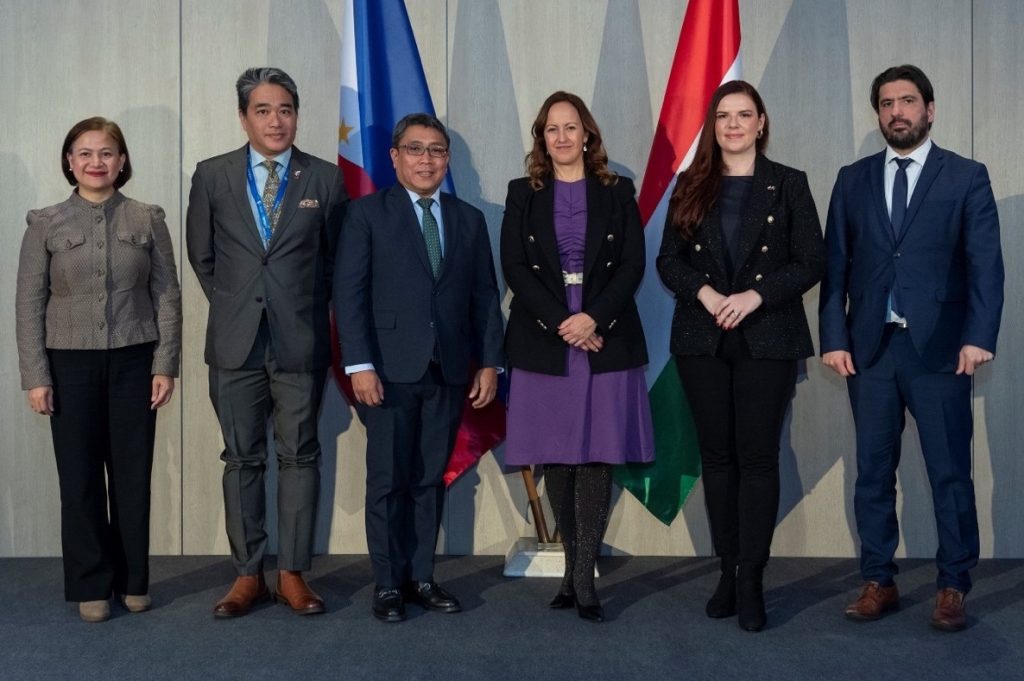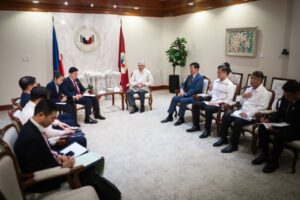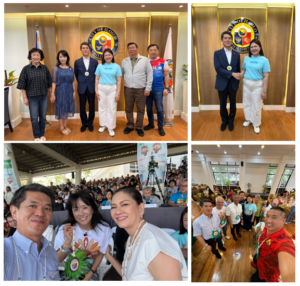
The Philippines’ Board of Investments (BOI) in collaboration with the Department of Trade and Industry -Export Marketing Bureau (DTI-EMB), forged strong business partnerships with their Hungarian counterparts at the 5th Philippines-Hungary Joint Commission on Economic Cooperation (JCEC) early this month in Budapest.
The Philippine business delegation representing diverse sectors such as automotive battery, electronics, meat production, innovation/startups and recruitment services participated in the HU-PH Business Forum and B2B Meetings, showcasing trade and investments opportunities of mutual interests between the two countries.
Organized by the Embassy of Hungary in Manila, the Hungarian Export Promotion Agency (HEPA) and the Hungarian Ministry of Foreign Affairs and Trade (MFAT), the forum was attended by over 70 Hungarian businessmen with interests spanning from agriculture/ agro-processing/food, green and renewable energy, manufacturing/ toll manufacturing of auto parts, healthcare/cosmetics, industrial machinery and furniture, ITBPM/software solutions and fintech/digitalization, startup for agriculture, waste management, water technology and wholesale/distribution of various products, and many more.
The two-day business activities in Hungary and bilateral meetings were seen to further enhance the economic relations of the Philippines and Hungary, particularly in the areas of trade and investments.
In his welcome address, DTI Undersecretary for International Trade Policy Group Allan B. Gepty, who headed the Philippine Delegation and is the Philippine Co-Chair for the 5th PH-HU JCEC, cited the Philippines’ strong economic performance and its comparative advantage to becoming the manufacturing and research and development hub in Asia.
He noted the center of economic activities is now in Asia, particularly South East Asia, to which the Philippines as the fastest growing economy in the region, serves as the key gateway.
He said, “Under the current setting, where the ASEAN region is at the core of economic activities from conceptualization to commercialization, the Philippines can serve as Hungary’s major link or hub in the region. With the Philippines’ dynamic workforce, strategic location, economic reforms and trade and investment policies, it is well-positioned to be the regional hub, for Smart and Sustainable Manufacturing and Services, and a center for training and education, research and development, innovation, and investments.“
Undersecretary Gepty further highlighted the Philippines is a party to the Regional Comprehensive Economic Partnership (RCEP) Agreement, the implementation of which is expected to further fuel growth in the economically dynamic Asian region, which is home to economies that are leaders in their respective fields of comparative advantage.
Director Lanie Dormiendo of the International Investments Promotion Service of the DTI–BOI stressed the agency’s positioning strategy, which involves leveraging market-based tools that empower the private sector, with a key emphasis on vital sectors in which the Philippines has very strong competencies. She cited the country’s strong sectoral complementation with Hungary, particularly in agribusiness (poultry and meat processing), electronics manufacturing services, EV battery/ green metals and water treatment and supply technologies.
Subsequently, HEPA Chief Executive Officer Gábor Jenei underscored HEPA, a non-profit organization, aims to support Hungarian companies in successfully entering foreign markets like the Philippines through its new and professional services. This includes providing information, arranging of G2B or B2B networking events/ exhibitions, and offering grants to Hungarian SMEs.
This year also marks the 50th year anniversary of diplomatic relations between two countries. Hungary’s MFAT Deputy State Secretary (DSS) Katalin Bihari, reaffirmed the flourishing economic bilateral commitment of Hungary with the Philippines. She expressed Hungary’s highest appreciation to the Philippines for the latter’s dedication and efforts to further strengthen cooperation and to bringing reliable and well qualified Filipino workers to Hungary.
Meanwhile, Assistant Secretary for Public Policy and International Cooperation of the Philippine Department of Migrant Workers (DMW) Mario Tan Zinampan, who was among the speakers from the Philippine government side, confirmed the opening of a labor office under the Philippine Embassy in Budapest in the coming year to support labor and welfare concerns of Filipino workers in Hungary.
The PH-HU diplomatic relations had been established in 1973, and the bilateral economic relations, especially on trade, grew substantially in the past five years upon commencement of the bilateral JCEC. In 2022, Hungary was the Philippines’ 45th trading partner (out of 231), with almost USD 190 million trade values; 29th export market (out of 213), and 60th import source (out of 216).


